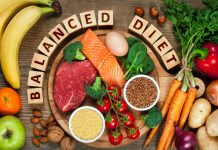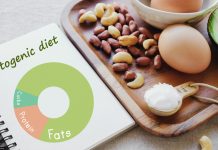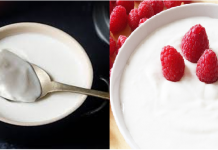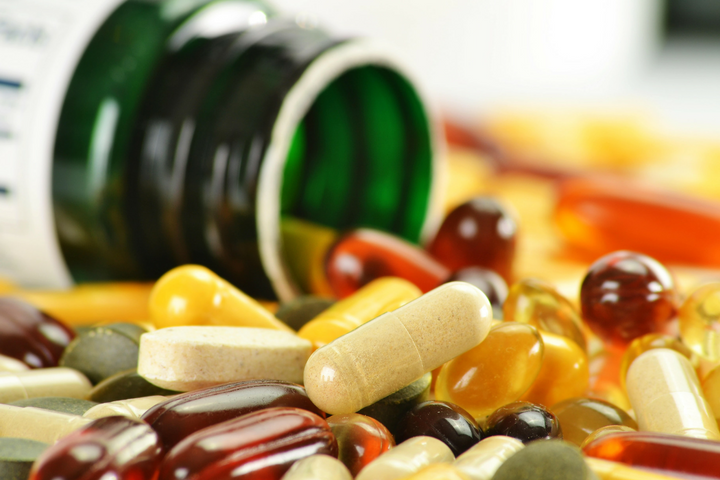A well balanced diet contains vitamins in required amounts. Deficiencies in any of these can lead to various health disorders. So what are vitamins? They are a group of substances that are essential for the normal functioning of the various body processes. And what’s the need of these ‘vitamin’ supplements? Vitamin supplements may prove to be beneficial in periodic shortfalls of vitamins from diet. However, taking vitamin supplements under the guidance and advice of your health practitioner is highly recommended since high doses of such supplements could also lead to a lot of health risks.
Firstly, we need to understand that vitamins are of two types – fat soluble and water soluble, and that the recommended intake of each of these vitamins depends on your age, gender, pre-existing medical conditions and reproductive status. Consultation with your doctor is advised to know your RDA of vitamins.
Vitamin A
These are fat soluble vitamins present in fish liver oils and is very important for normal vision and functioning of heart, kidney and other organs; Vitamin A deficiency, if untreated, can lead to night blindness. Vitamin A in dietary supplements is available either as pro-vitamin A or preformed vitamin A and a combination of both. Multivitamin supplements also contain vitamin A. But too much is bad too. High doses of Vitamin A can lead to dizziness, coma and in pregnant women it can lead to birth defects and, sometimes, even death.
Dietary sources: Sweet potatoes, carrots, spinach, mango, guava, cantaloupe, papaya, watermelon, whole milk, salmon can be named among many.
Vitamin B
Vitamin B is a combination of Vitamin B1, B2, B3, B5, B6 and B12. These are water soluble.
Dietary sources: Nuts, oats, rice, cereals, eggs, cauliflower, mushrooms and legumes.
Vitamin B1, also known as thiamin, is important for proper functioning of muscles, heart, nervous system, and the deficiency of this may lead to some serious diseases. However, excessive intake of thiamin may have adverse effects on health.
Vitamin B2, known as Riboflavin, is important for maintaining healthy skin and hair and this assists in formation of antibodies. Deficiency of B2 can lead to cracking of skin.
Vitamin B3, known as Niacin, improves blood circulation and reduces cholesterol levels.
Vitamin B5, known as pantothenic acid, helps resist stress. Vitamin B complex supplements generally contain vitamin B2, B3 and B5.
Vitamin B6, known as Pyridoxine, is important for functioning of the central nervous system and metabolism of fats and carbohydrates. Deficiency of B6 can lead to weekend gland and organ functioning. Vitamin B6 supplement is usually available in the form of pyridoxine and is also available in combination with other B vitamins and multivitamins. Excess amount of Vitamin B6 can lead to nerve damage.
Vitamin B7 also known as Biotin is a key requirement for important processes like metabolism and synthesis of fat. Though excess can cause an increase in blood cholesterol levels, Biotin is easily available and distributed in foods and is required in very small quantities. Low biotin levels in body can result in depressions, pale and dry skin, hair loss, nausea, weakness, and fatigue. B7 is mostly a part of B complex supplements and are also called Adrenal Support Complex or Energy Complex supplements.
Vitamin B12, known as Cobalamin, helps in formation of red blood cells. Deficiency of this vitamin leads to anemia. Supplements of B12 are available in combination with other B vitamins, with folic acid and separately as Vitamin B12 supplements. These are also available as pills, sublingual forms (dissolved under the tongue), administered as a shot to treat B12 deficiency and also prescribed in nasal gel form.
Folate is another B vitamin (Vitamin – B9) that helps formation of bone marrow cells and functioning of liver. Folate is available as supplements in prenatal vitamins, in B vitamins and multivitamin combination. High dose of folate from supplements without appropriate guidance can lead to severe complications.
You May Also Like: Know Your Supplements
Vitamin C
Known as Ascorbic acid, vitamin C is also a water soluble vitamin and protects cells from attack of free radicals; in short it’s the antioxidant that’s great for you. Multivitamin supplements that contain Vitamin C are available as sodium ascorbate or calcium ascorbate. High intake than the recommended dose of vitamin C can lead to hemochromatosis.
Dietary sources: Most citrus foods such as lemons, strawberries and oranges. Broccoli, bell peppers, gooseberry (amla).
Vitamin D
This fat soluble vitamin helps in the formation of healthy bones and teeth and helps in absorption of calcium and phosphorus. Vitamin D4 in particular is formed in the skin by the action of sunlight. Vitamin D in supplements is available as Vitamin D2 (ergocalciferol) and Vitamin D3 (cholecalciferol). Deficiency of Vitamin D leads to rickets where bones become soft and fragile. Excessive intake of Vitamin D can lead to poor appetite, headaches, and dry mouth to name a few.
Dietary sources: Fatty fishes like mackerel, tuna, salmon and fortified dairy products are rich sources of vitamin D.
Vitamin E
This is a fat soluble vitamin and acts as an antioxidant too. Foods such as wheat germ oil, nuts such as almonds are rich in Vitamin E. It slows cellular aging, repairs damaged skin and is good for your hair. Vitamin E also balances hormones and can effectively reduce symptoms of PMS. Vitamin E deficiency can lead to diseases of the skin. Vitamin E supplements are available either as Vitamin E separately and in combination with multivitamin – mineral supplements. However the doses of Vitamin E in Vitamin E – only supplements are higher than the recommended amount. High intake of Vitamin E can lead to bleeding disorders by reducing the ability of the blood to form clots.
Dietary sources: Cod Liver Oil, almonds, spinach, sweet potato, sunflower seeds, olive oil.
You May Also Like: These Supplements Will Help You Improve Your Strength
Vitamin K
Another fat soluble vitamin, Vitamin K is found in foods such as spinach, cabbage, egg yolk and helps in normal clotting of blood. Vitamin K supplements are available as Vitamin K1 and Vitamin K2 that is advised to be consumed upon consultation with your health practitioner. High doses of this may lead to blood clotting disorders.
Dietary sources: Green leafy vegetables, Cauliflower, broccoli, spring onion, cabbage, figs and blackberry.
Who benefit from vitamin supplements?
It is always advised that you try and consume these vitamins as part of your diet. However, certain groups of people may benefit by the intake of vitamin supplements and these include the following:
-Expectant and lactating mothers
-Elderly people
-People with certain absorption disorders such as Lactose intolerance
-Children who refuse to eat a balanced diet and people with irregular eating habits
High doses of vitamin supplements may lead to adverse effects. The intake of these supplements depends on the medical condition of the person and on the eating habits that can vary from one individual to another. A detailed consultation with your health practitioner and dietician is highly recommended before consuming vitamin supplements.


 Traqade
Traqade































Taking a multivitamin is a great way to ensure you’re getting all the nutrients you need, but for maximum effectiveness, it’s important to take it correctly and choose the best option for you. I advise you to look at this one https://www.amazon.com/Bariatric-Multivitamin-Supplements-All-One/dp/B0BY9D29R3
Great insights on the importance of understanding supplements! Choosing the right vitamins can make a big difference in overall health. I recently came across an interesting resource that might be helpful: https://teraboxsmodapk.com/.
Understanding the right vitamins for your body is essential for overall health. This post does a great job of breaking down key supplements! I’ve also come across some interesting insights on mindful choices https://3pattiblues.com/. Thanks for sharing this valuable information!
Excellent insights on essential vitamins! It’s always important to choose supplements wisely for overall health. Also, staying secure online while researching health topics is crucial—https://smadavs.com/ helps keep devices protected. Thanks for sharing this valuable information!
Excellent insights on essential vitamins! It’s always important to choose supplements wisely for overall health. Also, staying secure online while researching health topics is crucial https://smadavs.com/ helps keep devices protected. Thanks for sharing this valuable information!
Great breakdown of essential vitamins and their benefits! It’s so important to understand what our bodies actually need rather than just following trends. For those looking for more insights, check out https://carxstreetsmodapk.com/.
Understanding the right vitamins for our body is essential for overall health. This post does a great job of breaking it down! I’ve also been exploring more on maintaining a balanced lifestyle, and resources like https://bitlifeapkmods.com/ have been quite insightful. Thanks for sharing this valuable information!
Great reminder that understanding our supplements is just as important as taking them. Vitamins play such a key role in maintaining energy, focus, and overall health. I try to balance good nutrition with the right supplements—and after a healthy day, I enjoy a small glass of Red Wine or Sake to unwind in moderation! from https://www.rngwine.com/
From aspiring medics tackling UCAT to younger students taking AEAS or UKISET, the non-JUPAS path is filled with opportunities. Expert tuition helps sharpen skills, develop critical thinking, and create a roadmap to academic success beyond local systems. For more, click here https://ascent-prep.com/
When applying to UAL, creativity and originality matter. But so does your English proficiency. A strong IELTS band score shows you’re ready for academic discussions and critiques. Combine your artistic voice with clear communication for a successful study abroad journey. For more visit https://linkedu.hk/
I wore a navy blue Kurung Songket last weekend, and the Songket Embroidery shimmered beautifully under the lights. Paired it with a gold Tudung Instant Sarung, and I received so many compliments. It’s amazing how Malaysian fashion lets us stay rooted in heritage while still being stylish and current.
for more https://carlanisa.com/
Working with an automation agency has completely changed our internal processes. AI agents now handle lead qualification and follow-up tasks automatically. With proper automation management, the system just keeps getting smarter. The time and energy we’ve saved is unreal. Anyone else using AI automation for outreach and CRM workflows? For more visit https://attorus.com/
Fantastic breakdown of essential vitamins and their benefits! This post is a great reminder to prioritize a balanced diet and consult professionals before taking supplements. After reading up on health tips, I unwind with games like Hill Climb Racing—its strategic gameplay keeps me sharp! For iOS users, check out this guide to download it: https://hcracingapk.com/hill-climb-racing-for-ios/. Thanks for the insightful info!
Love this! Valentine’s Day doesn’t have to mean breaking the bank on outfits. These affordable ideas prove you can look stunning without overspending. https://playcarsimulator2.com/ Mixing statement accessories with budget-friendly basics is such a smart approach. Perfect for anyone wanting to feel confident and stylish on a romantic night out or a casual date.
Esta beca rita cetina prioriza a estudiantes inscritos en secundarias públicas, especialmente en zonas vulnerables o escuelas consideradas prioritarias o susceptibles de atención
https://becaritacetina.co/
You can compare epilator prices in Pakistan across different brands and models to find one that matches your grooming needs. Entry-level models are ideal for quick touch-ups, while high-end epilators with advanced attachments provide salon-like results at home. Comparing features like speed settings, tweezers, and wet-and-dry usage helps buyers make a smarter investment. https://powerhouseexpress.com.pk/collections/epilators
The article does a great job explaining how vitamins play such an important role in maintaining overall health. For anyone interested in exploring useful tools and apps alongside health resources, getmods can be a handy place to check out.
Vitamins and supplements play such an important role in maintaining overall health. They help fill nutritional gaps, support immunity, boost energy, and improve mental focus. While a balanced diet should always come first, the right supplements can make a real difference for those with specific needs. Whether it’s vitamin D for bones, B-complex for energy, or omega-3s for heart health, they’re a great wellness support.
When planning your supplement intake, timing can be just as important as the dosage. For instance, certain vitamins are absorbed better at specific times of day or alongside meals. To help you plan optimal schedules for your supplements, you can use time calculator tools that make it easy to figure out the right intervals and timings for maximum benefit.
Great breakdown of how vitamins impact overall wellness. It highlights how making the right choices in one area can improve balance in daily life. In a similar way, I’ve been using Torrentio (https://gettorrentio.com/
) to streamline entertainment—both are about making smarter decisions for better living.
Great breakdown on the importance of understanding supplements like vitamins before adding them to daily routines. Just like with health, even in tech tools it’s important to know what you’re using — for example, I found https://bloxstrappc.com/ really helpful once I understood how it works. Having clarity makes all the difference.
wow good post
Green Flame Fuel: wood pellets is a comprehensive information resource promoting the UK as a global supplier of quality, environmentally-responsible forest products from sustainably-managed forests.
Fresh poppy pods are the seed pods that are harvested from the poppy flower. Poppies are known for their beautiful flowers, but it’s their seed pods that are of the most value. These pods contain the seeds for the next crop and, when dried, they are frequently used in floral arrangements and other decorative crafts. By using fresh poppy pods, you can take your art to the next level as it gives a natural and pleasant look to your creations.
Interestingly, I recently came across a tool called https://deltaxcutor.com/which is popular in the tech and gaming community for running custom scripts safely within Roblox. It’s unrelated to health, of course, but it reminded me how, just like vitamins support body functions, tools like that can enhance performance when used properly and responsibly — balance and caution are key in both cases.
When managing my own health routine, I’ve found it helpful to use reliable sources to track supplement effects and safe intake levels — similar to how I research trusted Android utilities and recovery tools on https://gsmneofrpgratis.com.mx/ where accuracy and reliability matter just as much. The same principle applies to health: the right information makes all the difference.
**Green Flame Fuel: Wood Pellets** serves as a comprehensive resource highlighting the UK’s role as a global supplier of high-quality, environmentally responsible forest products sourced from sustainably managed forests.
Fútbol Libre
Thanks for the clear breakdown of vitamins and how they support overall health — supplements can feel overwhelming, so this guide helps a lot. If you ever want a fun break with creative storytelling or short interactive content, check this out: https://popiplaytime.com/.
In an era where taking the right vitamins is crucial for supporting your body’s functions, using reliable tools to track your habits becomes just as important. The article on supplements highlights how a balanced diet forms the foundation and how vitamins can fill in the gaps when needed. Meanwhile, someone editing a quick before-and-after video could open Inshot APK and use its filters and timeline to share their wellness journey in a creative way. Integrating nutritional awareness with visual storytelling brings both health and engagement into focus. By combining smart supplement choices with accessible editing tools, it’s easier to build a consistent routine that feels personal and motivating.
Great breakdown on the different vitamins and their benefits! It really shows how small daily choices can make a big impact on health. It’s interesting how balance and strategy play a role in wellness, just like in games that require thoughtful moves, such as the 3 Patti Blue latest version
Really appreciate how clearly you broke down the role of essential vitamins—especially the reminder that supplements should support, not replace, balanced nutrition. I’ve been trying to build healthier habits myself, and reading posts like this helps keep things on track. For anyone who wants to log personal routines or track habits more easily, I found the 3 Patti Live login page useful as part of my daily checklist.
Great breakdown on the importance of understanding vitamin supplements before adding them to a daily routine. It’s refreshing to see a clear explanation of how each vitamin actually supports overall health. Even though my website focuses on gaming insights like the 3 Patti Super latest update, I found your approach to simplifying complex topics really valuable and easy to follow.
Great breakdown of how different vitamins actually function in the body—especially the reminder that supplementation only works when you understand what you’re missing. I’ve been trying to be more intentional about what I take, and resources like this really help. I also use tools like GetLolSkin to keep track of my daily habits, which makes staying consistent a lot easier.
This is such a helpful breakdown of essential vitamins and their roles. It really highlights why a balanced diet matters and why supplements should be taken carefully and only with proper guidance.
Great post! Understanding the role of each vitamin is so important for overall health. I recently found a tool that makes sharing insights about supplements more fun—check out https://clownfishvoicechangerr.com/ for a creative way to discuss nutrition topics.
Great breakdown on the importance of understanding supplements like vitamins before adding them to daily routines. Just like with health, even in tech tools it’s important to know what you’re using — for example, I found https://fluxusexecutorpc.com/ really helpful once I understood how it works. Having clarity makes all the difference.
Blending smart wellness habits with creative visuals becomes effortless when you use PicsArt Pro APK. Its premium tools help you turn your health journey into inspiring, aesthetic edits that keep you motivated every day.